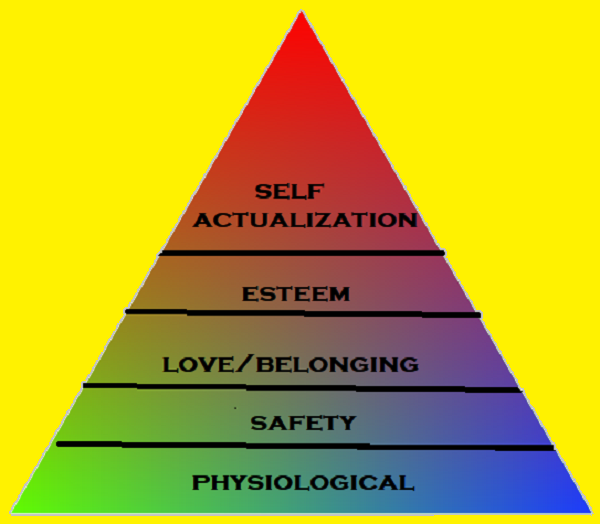
First up, while it's a bit old and has had challenges over the years, I think Maslow's Hierarchy of Needs actually captures the levels of stuff one needs to satisfy in order to be happy. If you don't know about Maslow's Hierarchy, Wikipedia has a great write-up: Maslow's hierarchy of needs.
For those who do know, here's a reminder of what it looks like:
There are three really obvious things the hierarchy tells us about how money relates to happiness:
Money buys some happiness: The two lower levels of the hierarchy are achieved almost directly through having money.
But money does not buy all happiness: The upper three levels of the hierarchy, however, have little relationship with happiness. It's true that money can help with them (if you don't need to work, you can spend more time with your family, and feel more love/belonging, for example). But money is neither the only nor a sufficient tool for fulfilling these needs.
This is where the $75,000 comes from: I am willing to bet that the oft-quoted 'you won't be any happier after you make $75k' (see other answers for more detail) comes from the above two observations. $75k, pre-tax in the US is probably what's required to pay for solid fulfilment of the two lower layers on the pyramid for an average family in an average town. Anything more than that and you're trying to buy happiness in the upper layers and that won't necessarily work.
That's the basics, but as we're on the topic, here are some less obvious conclusions that one could also draw and try to live by:
Aim for a net worth of $3,000,000: Most healthy, working people in the developed world achieve the bottom two layers but do so based on income. This means they have to keep working to keep even those bits of their happiness in tact. If they lose their job, they get unhappy and the fact that they secretly know they could always lose their job probably gives them a bit of anxiety (and anxiety = unhappiness). This is why wealth is worth having. Once you have enough capital to generate $75k a year without lifting a finger you will have as much money as you need to be as happy as money itself can buy. Assuming a conservative 2.5% draw-down rate, that requires $3,000,000.
Don't skip the steps: A key point of Maslow is that you should focus on attaining the layers in sequence. Now, it's ok to spend money to try and achieve fulfilment on the higher levels - some people reach self-actualization by looking great and owning expensive clothes and that's ok (don't judge!). But it's a mistake to do this before you have the lower levels completed. In other words, over-spending before you've saved your $3M might be non-optimal.
You're in control of How Much is Enough: if you can convince yourself that you are equally ok living in a cheaper town or driving an older car or having a smaller home, you will be able to reduce the level of income (or, if you're in the fortunate position, wealth) you need to fulfil the two lower layers. This is worth doing because once you've done that, everything else you make (or put time into) can be focused on the higher-level stuff that will get you really happy. Another way of putting this is: avoid falling into the trap of requiring such a high grade of the basics that you never even get to self-actualise.
Hi! I am a robot. I just upvoted you! I found similar content that readers might be interested in:
https://www.quora.com/Can-money-really-buy-happiness-If-yes-then-how-and-if-not-then-what-can-bring-happiness
Congratulations @azix! You have completed some achievement on Steemit and have been rewarded with new badge(s) :
Click on any badge to view your own Board of Honor on SteemitBoard.
For more information about SteemitBoard, click here
If you no longer want to receive notifications, reply to this comment with the word
STOP